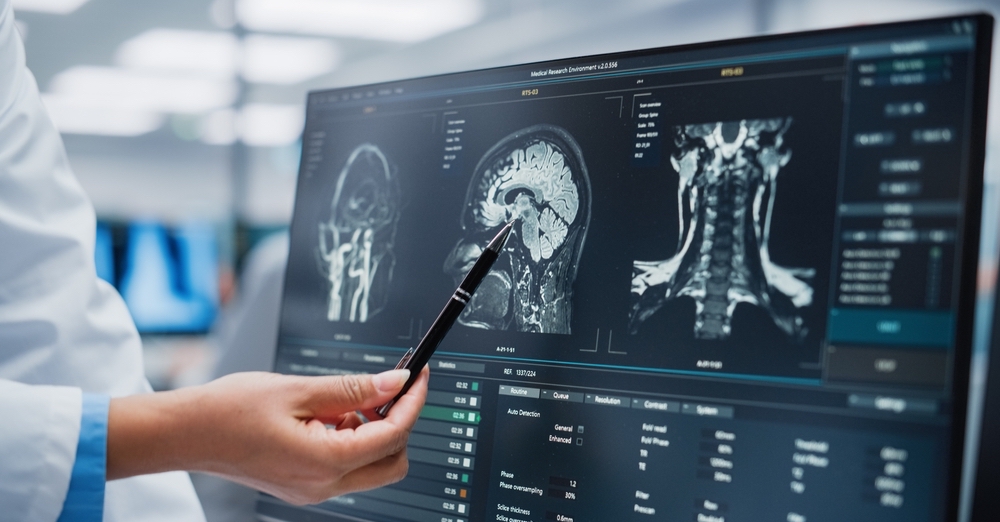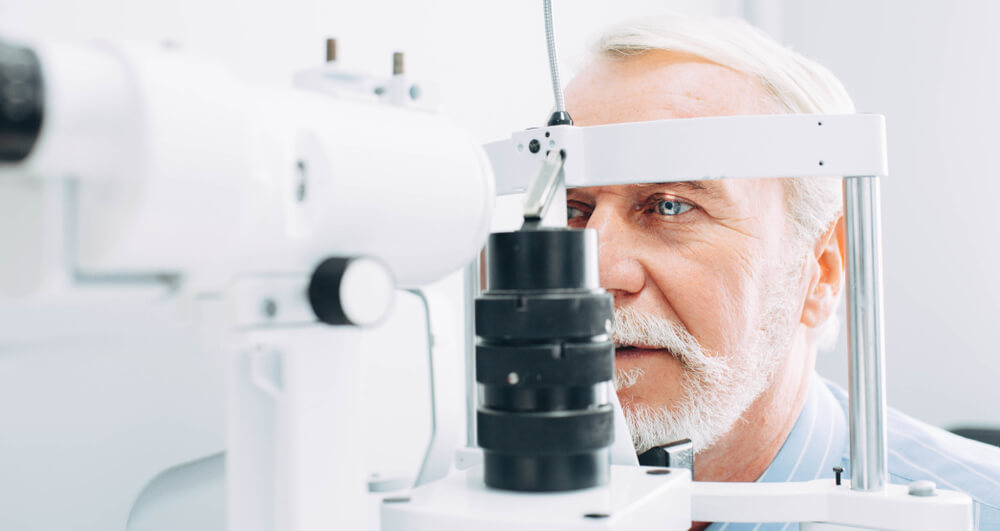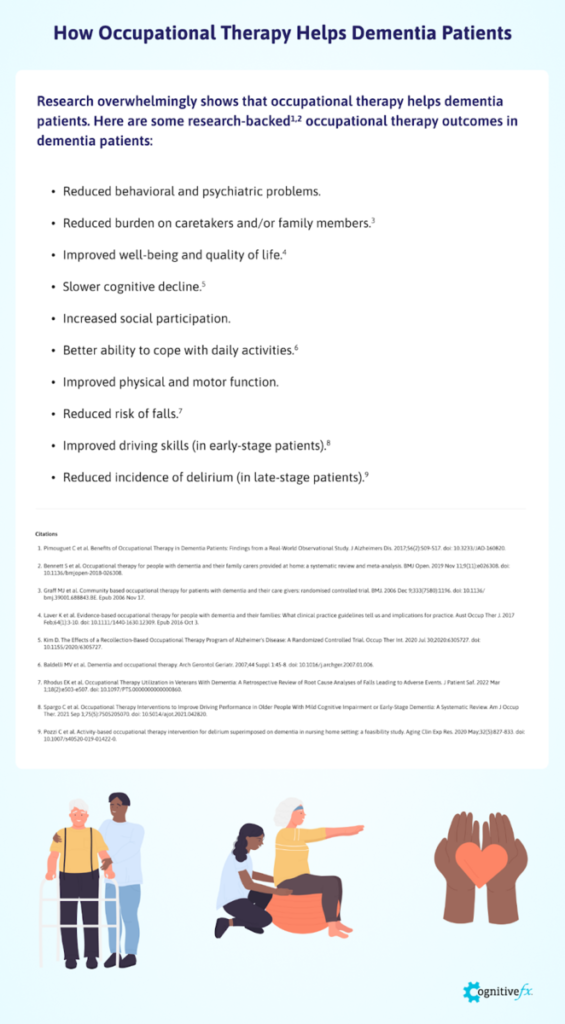If you’re worried about your memory or thinking skills, you may wonder if you have Alzheimer’s Disease or another form of dementia. The big question is: What should you do next? What type of doctor do you need to see?
Dementia doesn’t fall neatly into one medical specialty. If you have a heart problem, you see a cardiologist. If you have an eye problem, you see an optometrist or ophthalmologist. But if you have dementia, there isn’t one type of doctor that is “best” for all dementia cases.
Dementia patients often need a cross-disciplinary approach and benefit from visiting multiple healthcare professionals, potentially including family doctors, geriatricians, neurologists, and physiotherapists, to name just a few.
We know it can be tricky to know exactly which healthcare professionals to consult for dementia. In this article, we list some of the most common doctors, nurses, and therapists involved in diagnosing and treating dementia. We highlight what they can do for you and when they can be most helpful.
It’s unlikely that you’ll need to see all of these professionals—needs vary significantly from patient to patient—but we hope this list will be a good starting point to help you understand your options.
In this article, we discuss the following medical professionals and their role in dementia care:
- Primary care doctors
- Geriatricians
- Neurologists
- Psychiatrists and psychologists
- Nurses and mental health nurses
- Occupational therapists
- Physical therapists
- Cognitive therapists
- Speech and language therapists
- Sleep specialists
- Optometrists and opticians
- Audiologists
- Nutritionists
- Dentists and dental hygienists
- Dementia clinics like Neural Effects
We also explain what kind of treatment options are available at our dementia clinic, Neural Effects.
Neural Effects uses the latest evidence-based techniques to diagnose and help dementia patients. We are located in Provo, Utah and serve anyone in Salt Lake City or the Utah Valley area. We are in network for most types of medical insurance. Schedule your evaluation today.
How Primary Care Doctors Can Be Involved in the Diagnosis and Treatment of Dementia

Family physicians (primary care doctors) are the first point of contact for many patients if they’re worried about memory loss or other signs of dementia. It’s common for patients to visit the same doctor for years, putting these doctors in an ideal position to detect even small changes in thinking and behavior which may signal dementia.
These doctors can:
Help patients navigate the dementia diagnosis process: To determine if patients have dementia, family doctors ask patients about their symptoms, medical history, and other aspects of their health. They’ll ask if they struggle with daily life activities like getting dressed, cooking, or taking their medication on time.
These doctors also use multiple tests to check the patient’s cognitive abilities, such as short-term and long-term memory, thinking and concentration skills, and language and communication, to name just a few. If your family doctor suspects dementia but cannot make a full diagnosis, they will refer you to a specialist, such as a geriatrician or a neurologist (more on these specialist doctors in the next section).
Exclude other conditions that look like dementia: Family physicians also consider and test for conditions that are often confused with dementia, such as depression, thyroid disease, infections, vitamin B12 deficiency, unknown chronic conditions, and side effects from medication.
Here are examples of blood tests and other types of tests they might order:
- Liver function test
- Kidney function test
- Thyroid function test
- Hemoglobin A1c levels
- Vitamin B12 and folate levels
- Urine test
Provide post-diagnosis management and integrated care: Management after diagnosis involves various facets of care, including suitable nonpharmacologic and pharmacologic interventions for the patient, as well as finding ways to support caregivers and other family members.
Family doctors need to make sure the patient understands what the diagnosis means and what’s going to happen next. These doctors should also tell patients where they can get further information and share any local sources of support.
Specialized Doctors Who Diagnose and Treat Dementia

Primary care physicians can perform an initial assessment but often refer patients to a specialist to confirm the diagnosis and determine the type of dementia.
The specialists listed below can evaluate memory problems and thinking issues associated with dementia. It’s not unusual for patients to need to see two or more specialists who combine their findings to reach a diagnosis. This is especially true for patients with unusual symptoms and for those younger than 65 years of age.
Geriatricians
Geriatricians are primary care physicians with additional training in diseases and conditions common among older adults (generally people 65 and over). They practice in outpatient settings, nursing facilities, and hospitals.
Some patients prefer to visit a geriatrician to get a dementia diagnosis. In this case, these doctors will perform the same types of tests described earlier. In more general terms, these doctors can also help manage age-related health issues that may or may not be caused by dementia.
These doctors can be especially beneficial when:
Patientsneed to take multiple medications. Many older patients manage multiple medications prescribed for a variety of health conditions. It’s essential to have a doctor who understands side effects and drug interactions, especially how they can affect older bodies. Geriatricians can help patients manage both over-the-counter and prescription medications correctly and determine the proper dosage.
Patients are experiencing mobility issues and increased frailty: Older patients will inevitably experience decreased mobility as dementia progresses. Geriatricians can assess the risk of falling and recommend strength and balance exercises or other therapies to increase safety and maintain independence.
Patients have recently been hospitalized: Geriatricians can provide guidance and support to help the recovery process after hospitalization. Especially after unplanned or emergency hospitalizations, older patients with dementia are at a higher risk for complications, and going back home can be difficult. Geriatricians can help patients make a smooth transition from the hospital back home, as well as assist with post-hospitalization recovery care.
Patients are experiencing a quick decline: Even reasonably fit and independent elderly patients with dementia can experience rapid functional and cognitive decline. Geriatricians can identify what’s causing the quick deterioration and suggest possible treatments.
Neurologists
Neurologists are doctors trained in diagnosing and treating disorders of the nervous system, including issues with the brain, spinal cord, and peripheral nerves. Neurologists typically receive some training in Alzheimer’s disease and other dementias, although not all will be as conversant in the area as others. If you are referred to a neurologist, make sure they specialize in treating patients with dementia.
For most patients, these doctors are the best option to get a dementia diagnosis. The diagnosis process may involve one or more of these tests:
Neurological tests: Neurologists test balance, reflexes, eye movements, and other sensory functions. To do this, they may ask patients to perform movements such as to push or pull their hands using their arms or to stand with their eyes closed while touching their noses.
Cognitive tests: Neurologists may use tests such as the Mini-Mental State Examination (MMSE) or Montreal Cognitive Assessment (MoCA) to assess cognitive skills in people with suspected deficits. These tests look at functions like memory, counting, reasoning, and language skills. For example, doctors may ask patients to draw a clock and mark the hands at a specific time, or they may give patients a short list of words and ask them to remember and repeat them later. If you want to find out more about these tests, we’ve described them in greater detail in another post about how dementia is evaluated.
Brain scans: Computerized tomography (CT) and magnetic resonance imaging (MRI) scans can be used to help confirm a dementia diagnosis once the simpler tests have ruled out other problems. Neurologists may also use these imaging scans to find other possible problems that could explain symptoms, such as brain injury from a stroke or a brain tumor.
These scans can:
- Help confirm a diagnosis and sometimes the type of dementia. This applies particularly to patients with vascular dementia.
- Show shrinkage in specific areas of the brain. For example, the frontal and temporal lobes are affected by shrinkage in frontotemporal dementia, while the temporal lobes are affected in the early stages of Alzheimer’s disease.
It’s important to note that brain scans should not be used to diagnose dementia in isolation. Even if a brain scan doesn’t show any obvious changes, it doesn’t mean patients don’t have dementia. While these scans can provide helpful information, they are not a direct measure of brain health.
After a diagnosis, neurologists may prescribe medication for dementia, as well as a variety of therapies to help slow down the progression of symptoms. We’ve written in detail about possible treatments for dementia, especially for patients with mild dementia.
Some useful questions to ask your doctor about medication include:
- How is this drug going to help me?
- How long before I see results?
- Are there any side effects?
- Can I drink alcohol while taking the drug?
- Is this going to affect my other medical conditions?
- How often will I need to see the doctor to review medication?
- If this drug doesn’t work, is there something else I can try?
If you or a family member have been prescribed medication for dementia, it’s important to keep regular visits with the neurology practice to review how well the medication is working.
Psychiatrists and Psychologists
Mental health disorders are common in dementia patients and often cause great distress and accelerate the progression of the disease. These patients need doctors specialized in treating mental health conditions in older patients, such as a geriatric psychiatrist or a geropsychologist. Neuropsychologists and neuropsychiatrists may also be helpful in ruling out possible causes for memory loss, such as depression. And they can help with behaviors that are caused by dementia, such as aggression and anxiety.
Practitioners of psychiatry assess mental health and cognitive function:
Psychiatric evaluation: Doctors will ask patients questions about their mood and sense of well-being, as well as check behaviors that may be causing concern. If needed, they’ll also talk with caregivers and family members to get a better picture of what’s causing their symptoms.
Cognitive and neuropsychological tests: Psychiatrists and psychologists also assess cognitive skills, including memory, thinking, language skills, orientation, and visual and spatial skills. For example, patients with Alzheimer’s disease often show a decline in executive function, problem-solving, memory, and the ability to perform automatic tasks.
Overall, psychiatrists and psychologists can:
- Assess whether mental health conditions such as depression and anxiety are caused by or comorbid with dementia
- Treat symptoms of depression, anxiety, or other mental health disorders (which may involve prescription drugs)
- Help with behavioral issues such as aggression
- Offer referrals to other health professionals, such as neurologists or geriatricians, if needed
- Assess if current medications may be causing problems with memory and thinking
- Help patients prepare emotionally for end of life
Therapy with a specialized counselor or psychotherapist can help patients cope with symptoms and increase their sense of well-being. Psychotherapists can help patients understand their thoughts and feelings toward the disease. Successful psychotherapy improves patients’ quality of life by reducing anxiety and depression and allows them to adjust to their changing situation. Not all providers offer talk therapy and not all are licensed to prescribe meds. It’s important to find a provider who offers the specific services you desire.
Nurses and Mental Health Nurses
There are many different types of nurses that can be involved in the treatment of dementia patients. These nurses are trained to identify needs and find ways to meet them, including short and long-term care, home safety assessments, and addressing the emotional needs of both patients and caregivers.
At home or in a care facility, nurses with experience in dementia can help patients get dressed, eat, and take their medication on time. More specialized nurses—called mental health nurses—can provide treatment, care, and support for patients with mental health problems and dementia. These nurses are experienced in assessing, diagnosing, and treating psychiatric disorders. They typically work alongside other health professionals in a medical team to provide the best possible outcomes for the patient.
Typically, nurses can:
- Build a personal relationship with the patient and their family
- Take the time to understand the patient’s life story, interests, preferences, wishes, social networks, and abilities
- Promote a dementia-friendly environment
- Seek alternative sources of support for the family, if needed
- Find ways to stay connected to the patient when verbal communication starts to fail
- Recognize signs of anxiety or distress
- Answer the family’s questions
Therapists Specialized in the Treatment of Dementia

After receiving a diagnosis, dementia patients can enlist therapists to help with symptoms. Therapy can help patients from the early to late stages of the disease, initially to promote independent living and, as the disease progresses, to help keep patients comfortable.
Occupational Therapists
These therapists can help dementia patients figure out the best way to maintain daily functioning, social interactions, and well-being. Occupational therapists will also recommend ways to adapt the patient’s living space, for example, by adding dementia-friendly clocks or labeling doors.
Therapists can also work with caregivers to offer advice and techniques for managing care. In addition, they can provide emotional support and information about available support groups.
Further reading: Occupational therapy for dementia
Physical Therapists
Physicaltherapists—also known as physiotherapists—can assess physical problems like balance issues and suggest exercises to help patients with daily activities. The aim is to encourage and promote physical activity and maintain the patient’s mobility and independence for as long as possible.
Physiotherapists can suggest a wide variety of exercises, from gentle walking and dance classes to seated exercises for patients with low mobility. These therapists are also trained to identify when patients are at a high risk of falls and suggest balance exercises to improve posture.
Further reading:
Cognitive Therapists
Cognitive therapy aims to keep cognitive impairment at bay, improve cognitive skills, and maintain quality of life for patients with dementia through activities such as word and number games, puzzles, discussion of current affairs, and practical activities, such as cooking or gardening. This approach improves memory, thinking, language, executive functions, concentration, and mood.
Further reading: Memory therapy for dementia
Speech and Language Therapists
Speech and language therapists can help dementia patients with problems related to attention and listening, communication, processing information, voice, and speech, as well as with swallowing difficulties.
Typically, treatment involves a customized speech and language therapy program. It also offers access to support groups, advice, and education for patients and caregivers.
Neural Effects uses the latest evidence-based techniques to diagnose and help dementia patients. We are located in Provo, Utah and serve anyone in Salt Lake City or the Utah Valley area. We are in network for most types of medical insurance. Schedule your evaluation today.
Other Healthcare Professionals Who Help Dementia Patients

In addition to the professionals listed above, there are many other doctors, nurses, and therapists who care for dementia patients. This section focuses on care providers who may not be involved directly in diagnosing and treating dementia, but who still help these patients by addressing other medical conditions—such as sleep disturbances or diabetes—that can make symptoms of dementia worse.
Sleep Specialists
Sleep disturbances are common in dementia patients. Following a good sleep routine every day and avoiding screens in the evening can help, but if the problem starts to cause major disruptions to their daily routine, patients may need to see a sleep specialist.
These specialists can determine whether sleeping difficulties can be treated with drugs or therapy. For example, they may suggest increasing levels of pain medication, psychotherapy to relieve anxiety, or treatments for other medical conditions that may cause or exacerbate sleep issues. In most cases, sleep medication is not recommended for patients with dementia because of an increased risk of falls and mental confusion. In extreme situations, doctors may suggest trying medication for a short period, but only if non-drug treatments have failed.
Optometrists and Opticians
Living with dementia can affect all aspects of a person’s life, including vision. Patients with dementia often experience problems with their sight and visual perception, which leads to confusion and misinterpretations about the environment around them. This can increase the risk of getting a head injury or even exacerbate visual hallucinations.
Optometrists and opticians play an important role in identifying and addressing vision-related problems in dementia patients. However, they need to take a caring and supportive approach with these patients, as even routine eye tests can become difficult and confusing. Patients may struggle with identifying letters on the chart, understanding instructions, or communicating with the therapist, so they may need more time to feel comfortable. In addition, caregivers need to be aware that it’s crucial to have an up-to-date prescription to ensure patients wear the correct glasses.
Audiologists
Many people with dementia have trouble hearing, distinguishing between multiple conversations, and interpreting sounds, which can make their world a very confusing place. Hearing loss is increasingly common with age, but patients with dementia can experience additional difficulties. This often leads to frustration and distress, and patients become withdrawn.
If you or your loved one appears to be having hearing difficulties, book a hearing test with an audiologist. It may simply be due to a wax build-up, or they may need a hearing aid. Look for an audiologist who specializes in treating dementia patients because they will be more understanding and better able to tailor the process to the patient’s individual needs.
If the patient is already using a hearing aid, it is important to get it checked and maintained regularly. For example, if the batteries need changing, the hearing aid will start beeping, which may cause stress and confusion.
Nutritionists
It’s not uncommon for dementia patients to have problems eating. They may lose weight because they lose interest in food or are struggling to swallow, or they may gain weight because they forget they’ve already had a meal or developed a sweet tooth. Not eating a balanced diet can also lead to issues like dehydration, constipation, and urinary tract infections (UTIs), which aggravate their dementia symptoms.
A nutritionist can suggest ways to overcome these issues, such as making smoothies and shakes if the patient struggles to swallow or replacing high-calorie sweet foods with healthier alternatives, such as fruit or low-calorie jelly, to avoid weight gain.
Dentists and Dental Hygienists
Dentists and dental hygienists can provide patients and their caregivers with guidance and support on how to keep teeth healthy and prevent decay and gum disease.
Dentists will plan treatments bearing in mind that the dementia patient will eventually be unable to look after their own teeth. For example, they may decide against treatments like crowns, bridges, and implants if patients can no longer brush their teeth regularly.
For some patients, visits to the dentist can be very stressful and confusing, making treatment difficult or impossible. In this case, it can be helpful for the patient to be accompanied by someone they know and trust. The caregiver can remain by the patient’s side while they’re having treatment and offer reassurance if needed.
Dementia Clinics

Dementia clinics (sometimes referred to as memory clinics) were developed to offer accurate diagnosis and treatment for patients experiencing forgetfulness, difficulty concentrating, and other cognitive issues which may be caused by dementia.
In these clinics, patients can access some of the specialists described above, such as geriatricians, psychiatrists, neurologists, or occupational and physical therapists. Large medical centers are more likely to have all physicians and therapists needed on staff, whereas smaller clinics offer fewer services but can collaborate with other local practitioners.
This collaborative model is very beneficial for both patients and their caregivers. Visiting a dementia clinic:
- Results in fewer ER visits and hospitalizations
- Improves cognitive and emotional symptoms
- Leads to an earlier diagnosis
- Leaves patients happier with their care
- Results in shorter waiting times to see a doctor
- Helps to decrease the burden put on caregivers
- Increases caregivers’ and family members’ satisfaction with the medical care offered to their loved one
Staff at the clinic also help caregivers and family members adjust to a loved one’s dementia diagnosis. They offer practical advice to ensure patients have the best quality of life at home and suggest local groups for further support.
Further reading: What to expect from a dementia clinic
Treatment at Neural Effects
Neural Effects uses the latest evidence-based techniques to diagnose and help dementia patients. We are located in Provo, Utah and serve anyone in Salt Lake City or the Utah Valley area.
At Neural Effects, each patient needs to complete a neuropsychological exam (also called a neurocognitive evaluation) to determine what kind of cognitive issues they’re experiencing. We perform this exam on all patients even if they already have a diagnosis of dementia from their doctor because it provides key information to our therapists regarding how they should treat each patient.
The exam includes tests to assess several cognitive functions, including memory, thinking, language skills, and executive function. Our doctors also conduct a physical exam to assess eye movements, reflexes, balance, and how well your senses are working.
In addition, we assess your mental health to identify problems such as anxiety and depression. Finally, if our team suspects something other than dementia—such as a brain tumor, for example—they may request a CT or MRI brain scan.
After these exams, one of our clinicians will meet with you to discuss the results and suggest possible treatment options. We can use a wide range of therapies and activities, depending on what problems we identified during your initial exam. We draw from physical therapy, cognitive therapy, occupational therapy, and other therapy modalities.
For example, if you’re struggling with memory, our therapists will use exercises to stimulate the areas of your brain involved in memory. For example, a therapist might show you a series of picture cards and ask you to make up a short story, then organize the cards to follow the story. You’ll later be asked to remember the images in order. We also have a range of different activities to improve attention, executive function, thinking skills, language, vision, and more.
At Neural Effects, in addition to having many of the healthcare professionals listed above on our team, we offer something that not many other clinics provide: a sequence of aerobic exercise followed by therapy to maximize the benefit for the patient.
This combination of exercise and therapy works better than going through individual therapies in isolation. After physical exercise, patients experience a phenomenon in the brain called post-exercise cognitive boost (PECB). This mechanism involves the release of neurotransmitters that make the brain more “flexible” and able to benefit from therapy shortly after exercise.
You can attend the sessions with a family member or caretaker so they can learn the exercises and help you at home. At the end of each session, you will meet with one of our therapists to receive some feedback and a series of exercises to do at home. This is also part of treatment; completing the exercises at home is the best way to boost treatment efficacy.
This combined approach is most effective for those in the earlier stages of dementia, but it can continue until the therapists, caregivers, and patient agree that disease progression is too severe to continue.
All of our staff is experienced in dealing with dementia patients, and they can offer advice and answer any questions you may have about your diagnosis and treatment.
Neural Effects uses the latest evidence-based techniques to diagnose and help dementia patients. We are located in Provo, Utah and serve anyone in Salt Lake City or the Utah Valley area. We are in network for most types of medical insurance. Schedule your evaluation today.
